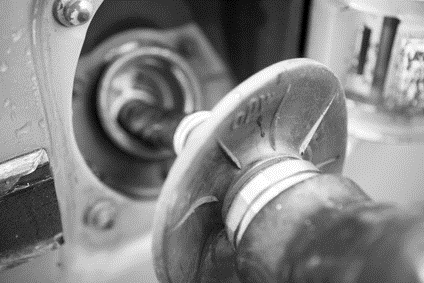
Acura's MDX crossover utility vehicle, introduced in 2001, combines crossover utility with the luxurious finishes buyers have come to expect from Honda's upscale brand. The 3.5L V6 motor that has powered the vehicle since its introduction offers competent acceleration, but fuel economy remains a concern for some owners. According to the United States Department of Energy, the 2009 4-wheel drive model returned only 15 mpg in the city and 20 mpg on the highway, similar to some V8 pickup trucks. Fortunately, MDX owners can take some simple steps to reduce their fuel consumption.
Use a tire pressure gauge to check the pressure on the MDX's tires on a weekly basis. Make sure that the tires are always inflated to within four to five pounds of the maximum pressure rating listed on the tire's sidewall. Maintaining the tires at proper inflation not only reduces the risk of a dangerous blowout, but it also lowers the rolling resistance of the tire itself, reducing the work the engine has to do to turn it.
Replace a dirty or clogged air filter. The air filter captures particles that could otherwise enter the fuel/air mixture going into the cylinders, thereby damaging the engine. Dirty filters allow less air to pass through than clean ones, reducing the engine's ability to "breathe" and depressing efficiency. Consider replacing the paper filter with a high-flow, replaceable unit such as K&N's Filtercharger. These aftermarket filters allow the engine to breathe more efficiently, which increases not only gas mileage but also power.
Replace the MDX's six spark plugs at the interval suggested in the owner's manual with platinum multi-spark plugs instead of the cheaper entry-level plugs. Worn spark plugs impede the ignition of the fuel/air mixture in the cylinders, leading to poor performance both in terms of power and fuel economy. While performance spark plugs cost more, they typically last longer than regular plugs, thereby delaying the wear that can retard gas mileage.
Inspect the contents of your MDX and remove all unnecessary weight. Carrying golf clubs, tools and other heavy items increases the load on the 3.5L engine by raising the mass it must accelerate to any given speed. If you won't be using a particular item or piece of equipment on a trip, leave it at home.
Modify your driving habits. Studies have shown that fuel economy drops off dramatically once a vehicle passes sixty miles an hour thanks to increased wind resistance at higher speeds. On the highway, consider traveling in the right hand lane underneath the speed limit to reduce the work your engine will have to do to push the vehicle through the air. In the city, avoid jackrabbit starts and rapid acceleration, both of which depress fuel economy.